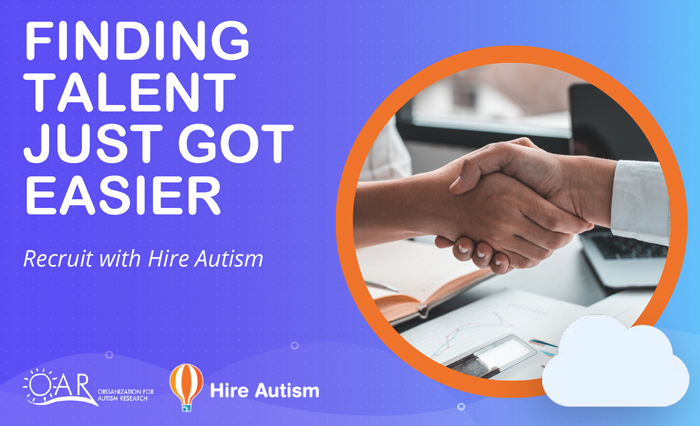Unemployment rates for autistic adults in the United States are staggeringly high. Recent statistics show that between 50% to 90% of autistic adults are unemployed or underemployed, making autism the highest unemployed disability (Steven Zauderer, Cross River Therapy). In addition, studies in the past decade estimate that nearly 85% of autistic adults with a college degree are unemployed (My Disability Jobs).
There are many reasons why autistic job seekers experience challenges when searching for or gaining meaningful employment, including:
- Stereotypes of autistic individuals
- Lack of understanding and inclusive hiring practices
- Differences in social and verbal communication
- Limited access to accommodations
Stereotypes
Often, autistic job seekers are overlooked or thought to fit a mold for a specific type of work. For example, it is a common misconception that all autistic adults are tech-savvy and looking for a job in IT. While that may be the case for some, the truth is that autistic job seekers seek a wide array of employment opportunities across all fields and industries that align with their unique strengths and interests. As Dr. Stephen Shore of Aldephi University stated, “If you’ve met one person with autism, you’ve met one person with autism.” That is to say that no autistic job seeker, employee, or person is the same.
Lack of Inclusive Hiring Practices
Another barrier to employment for autistic individuals is the lack of inclusive hiring, including recruiting and the onboarding process. Autism and neurodiversity must be a core component of an organization’s Diversity, Equity, and Inclusion (DEI) hiring practices. This goes beyond simply stating autism in your DEI statements and encompasses creating inclusive job listings, interviews, onboarding, and training. Companies must also consistently train and engage management on how to best work with autistic employees and actively consider qualified autistic candidates for various roles.
Social and Communication Differences
A core component of autism is social and communication differences or challenges. This can present difficulties in the interview process and on the job.
Social differences include:
- Lack of eye contact
- Taking pauses in between responses
- Misunderstanding facial expressions and nonverbal cues
- Interpreting phrases very literally (Help Guide)
Unfortunately, these social differences can significantly impact an autistic job seeker being hired and their longevity at an organization. Consequently, this can lead to qualified candidates being counted out after an interview, struggling to create strong relationships with managers and colleagues, and ultimately being let go or leaving their roles.
Limited Accommodations
Non-accommodating workplaces provide even more of a challenge for autistic job seekers. Under the Americans With Disabilities Act (ADA), autistic job seekers can request reasonable accommodations supporting their success in the interview or workplace. Despite common belief, accommodations usually bear little to no cost to implement. A recent study by the Job Accommodation Network (JAN) found that the average accommodation has a one-time cost of $300, with half of the 3,528 employers surveyed reporting that “the accommodations they made cost absolutely nothing to implement ($0).”
What Can Be Done
The big question is, how can organizations help combat these high unemployment rates? The good news is that much can be done to support meaningful employment and success for autistic adults.
Employers can begin by taking the following steps:
- Pursue learning opportunities and training
- Include autism in your DEI statements and hiring practices
- Build a more inclusive workplace by offering accommodations and listening to the needs of your prospective and current staff
Learning and Training Opportunities
The best way, and often the first step to understanding autism, autistic job seekers in the workplace, and how to best support inclusion throughout the hiring process and on the job is to learn about it. This can include but is not limited to exploring different online resources, taking training courses, independently researching, and asking questions. In addition, education and training, like the Uptimize Neurodiversity in the Workplace Training or The University of British Columbia’s Autism and Neurodiversity In Workplace Training, are great programs to help executives, managers, and staff gain a better understanding of autism in the workplace and how to support current and future autistic staff best.
Include Autism as Part of Your Hiring Initiatives
As job seekers explore different job opportunities and companies, they will be looking to see if the organization includes autism or neurodiversity as a part of their hiring initiatives and DEI statements. Not only does this encourage autistic job seekers to apply, but research has shown that having neurodiversity in your DEI initiative “creates an environment where neurodivergent employees may feel more comfortable seeking supports and accommodations without fear of retaliation, helping increase productivity as well as enhancing inclusion and belonging” (American Bar Association).
Build a More Inclusive Workplace
However, autism inclusion in the workplace is more than just having autism stated in DEI or hiring statements. It is about fostering a workplace that is inclusive of the needs of autistic job seekers and current autistic employees. Offering accommodations to those who need them is essential for both the success of job seekers in the interview process and employees within the workplace. Understand that every person is different, and what they might need to succeed will not look the same as someone else applying for the same role or doing the same job.
Common interview accommodations:
- Having a copy of questions in advance of an interview
- One-on-one interviews instead of a panel interview
- Time extensions or multiple attempts for on-demand interviews
- Phone interviews instead of video interviews or being allowed to have their camera off during a video interview (Hire Autism)
Common on-the-job accommodations:
- Shadowing a colleague during training
- Receiving a written copy of verbal instructions, or vice versa
- Receiving meeting agendas beforehand (Hire Autism)
- Wearing noise-canceling headphones
- Flexible or modified work schedules that factor in a break (Absence Soft)
Not all job seekers will disclose or request accommodations. Regardless, asking them is the best way to learn what any person needs to succeed. During the interview process, ask the candidate if they need anything on the job to support their employment. In addition, for your current employees, send out a survey and get a pulse on whether changes can be made to help increase their productivity and happiness.
It is important to note that in some circumstances, an accommodation request may be modified by the employer. In addition, accommodation requests may not be honored if it causes an undue hardship on the business.
Hire Autism is Here to Help
Hire Autism’s mission is to improve employment opportunities for autistic individuals and help businesses create more inclusive workplaces. To that end, we offer a free job board to support this mission where employers of all sizes and fields can post their available job listings. These can be full-time or part-time positions, internships, or contract roles. They can be in-person (based in the US), remote, or hybrid.
Becoming a Hire Autism Employer Partner allows companies to post job listings, directly connect with and recruit talented autistic candidates, and access training and support.
In a recent OARacle newsletter article, Hire Autism job seeker William Sowell shared that finding his current employer on Hire Autism encouraged him to apply for the position.
“If I had found them on Google, I might not have been as inclined to apply, but seeing them on Hire Autism gave me a lot more confidence that it would be a respectful and inclusive working environment,” Sowell said.
Sowell found employment with Hire Autism Employer Partner Compost Nashville LLC as a Collections Driver. For Dale Harper, operations and human resources manager at Compost Nashville, hiring the right member for the team was his highest priority.
“Choosing to recruit with Hire Autism gives confidence that we are accessing all talent pools in the Greater Nashville area,” said Harper. In Sowell, they found the right person to join the team.
All employer partners are granted one user account to the Uptimize Neurodiversity in the Workplace Training and continued support from Hire Autism staff about inclusive hiring practices.
At Hire Autism, we understand that knowing where to start can be challenging for many employers, but we are here to help. Get started by creating an employer account on Hire Autism or contacting us at mail@hireautism.org.
References
- www.autismcincy.org/autism-facts-statistics/
- www.crossrivertherapy.com/autism/autism-unemployment-rate
- www.americanbar.org/groups/labor_law/publications/labor_employment_law_news/spring-2023/
- www.mydisabilityjobs.com/statistics/autism-employment/
- www.hireautism.org/resource-center/interview-accommodations/
- www.absencesoft.com/resources/top-accommodations-for-employees-with-autism/
- www.hireautism.org/resource-center/the-autism-friendly-workplace/
- www.askjan.org/topics/costs.cfm
- www.researchautism.org/oaracle-newsletter/hire-autism-job-seeker-finds-meaningful-employment/






